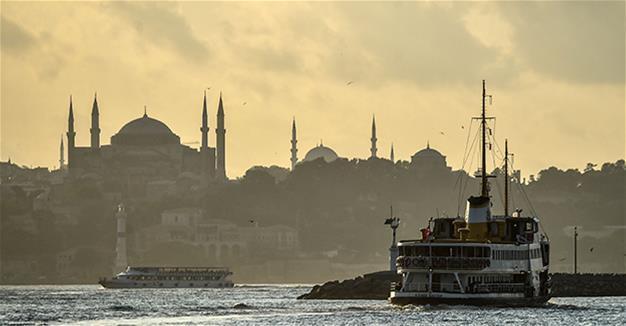Istanbul hotels occupancy rates soar in July but revenues keep plunging: Association
ISTANBUL

AFP photo
Hotel occupancy rates in Istanbul surged nearly 100 percent in July compared to the same month of last year but hotel revenues continued to decline, falling to around a third of hotels in cities such as Paris, the Hotel Association of Turkey (TÜROB) has stated.
TÜROB said in a statement on Aug. 24 that Istanbul saw the highest growth in hotel occupancy rates among all European destinations in July.
Hotel occupancy rates in Istanbul rose to 72.4 percent in July with a 97 percent increase compared to the same month of 2016, when a coup attempt hit the country, the association said, citing STR Global data.
“Despite this positive development, Istanbul’s revenue continued to be much lower than the European average,” it added.
Lower than European average
While the average room revenue was 253 euros in Paris in July, it was 83.2 euros in Istanbul, according to the statement. In Dubrovnik, one of the key competitors of Istanbul in tourism, the average room revenue was 208 euros in July, data showed.
The average rate in Europe was 116 euros in that month.
Hotels in Istanbul experienced a huge decline in both revenue per available room (RevPAR) and average daily rate (ADR), a measure of the average rate paid for rooms sold, in the first seven months of 2017.
In the mentioned period, the ADR plunged to 83.10 euros with a 21.9 percent decrease compared to the same period of 2016. The RevPAR also fell to 60.20 euros with a 7.40 year-on-year decrease, data showed.
TÜROB President Timur Bayındır said the figures showed that it is “not appropriate” to find the rise in hotel occupancy rates in Istanbul positive due to ongoing revenue plunge.
“The plunging 2017 revenues, which are even lower than the revenues in 2016 - which was a much tougher year - can be explained with a number of reasons, including a shrinkage in key markets, a decrease in the number of business events held in Istanbul, and an ongoing rise in room supply,” Bayındır added.
Even if security issues are not a concern for Istanbul at the moment, the previous problems are unfortunately manipulated and used as a trump card to further push down the city’s value, he said.
“In order to be able to recover our losses, we need time and proper plans,” Bayındır also stated.
Significant rise in foreign arrivals
Meanwhile, the number of foreign tourists visiting Istanbul rose 43 percent in July to 1.3 million compared to the same period of 2016, official data showed on Aug. 23.
The number of foreign arrivals also rose to 5.7 million in the first seven months of the year with a 6.3 percent of increase compared to the same period of 2016, with Germany, Iran, Saudi Arabia, Iraq and Russia becoming the top markets.
